The name of this site along with the title of this post reflects the reality of work for many. I would however like to back up that claim with some research. Fortunately, there has been a wealth of research performed since the pandemic began, which goes a long way to understanding what it is about work that sucks for us.
To summarise the results in short is:
- Unrealistic expectations over workload
- Too much of our time spent in emails, messages, and meetings
- A lack of work management that prioritises strategic goals
- Managers and teams are untrained in effective hybrid working practices
Each of these problems have simple fixes which have been tried and tested over many years, however they are not yet in common practice.
If understanding the problem is half of the solution then let’s get started.
Work seems to be bad for your health
Asana
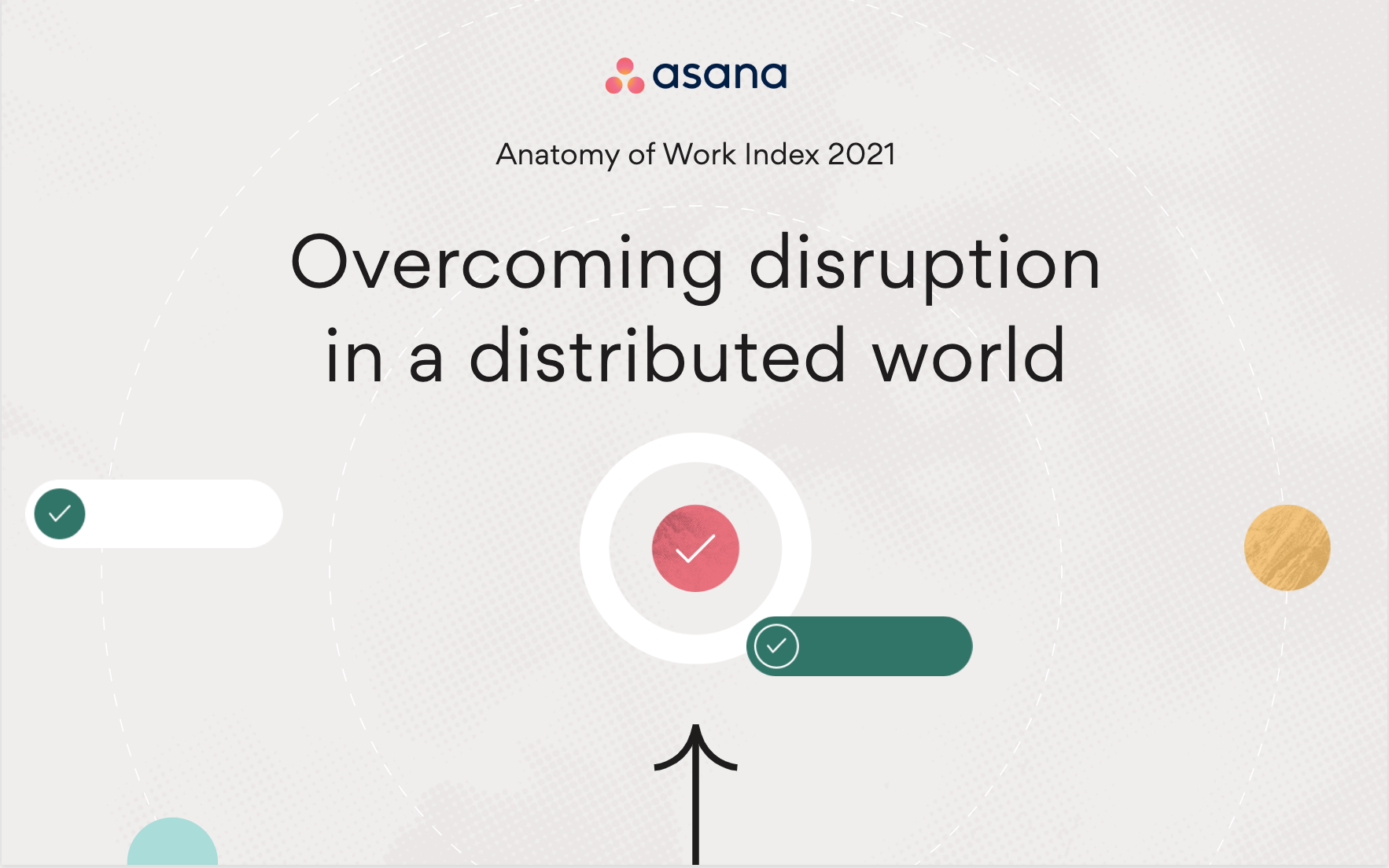 The Asana Anatomy of Work Index 2021 was conducted by Dr. Sahar Yousef, a cognitive neuroscientist at UC Berkeley’s Haas School of Business. She runs the Becoming Superhuman Lab, which studies the science of productivity.
The Asana Anatomy of Work Index 2021 was conducted by Dr. Sahar Yousef, a cognitive neuroscientist at UC Berkeley’s Haas School of Business. She runs the Becoming Superhuman Lab, which studies the science of productivity.
The report analysed the attitudes and behaviours of over 13,000 knowledge workers in Australia/New Zealand, France, Germany, Japan, Singapore, the U.K., and the U.S.
The report across all industries showed that 60% of our time is spent on work coordination. Rather than the skilled, strategic jobs, we’ve been hired to do. Only 26% of our time is spent on the skilled work we were hired for.
The report showed that remote working increased the number of meetings each day by an average of 2-hours. In the office, desk-side conversations helped information flow more naturally. However, we’ve replaced these informal catch-ups and quick Q&A sessions by booking 30 minute online meetings costing each employee 157 hours in productivity over the past year.
87% of employees in the study work almost 2 hours later every day. Yet, on average, the number of missed deadlines has risen by 26% each week. This is due in principle to an increase in workload.
The most common cause of missed deadlines was unrealistic expectations over workload. Having too high a workload, having too many emails and messages to respond to, and having too many meetings and video calls.
Three other factors came out of the report.
- 71% of knowledge workers experienced burnout in 2020, with 46% of respondents citing being overworked as a critical factor contributing to burnout
- 29% feel overworked from a lack of clarity on processes, tasks, and roles.
- Tool overload is hurting team alignment with workers switching between an average of 10 apps 25 times per day
World Health Organisation
The WHO publishes its Global Burden of Disease Information in the Lancet. Along with all disease this includes mental disorders and depression showing their global impact, the effects specific to work are significant.
The report shows that employee pressure levels have increased 3-fold since the pandemic, with 83% working overtime more than 3 times per week. High mental workload and multi-tasking are the top contributors to stress, with 97% of respondents mentioning needing to attend to multiple issues at once.
In a separate research paper published by the WHO and the International Labour Organization in 2021 showed that long working hours led to 745 000 deaths from stroke and ischemic heart disease in 2016, a 29 per cent increase since 2000. It is the first global analysis of the loss of life and health associated with working long hours. WHO and ILO estimate that, in 2016, 398 000 people died from stroke and 347 000 from heart disease as a result of having worked at least 55 hours a week. That is an increase of 42% in the deaths from heart disease and 19% from stroke since 2000.
Working 55 hours or more is now shown to be responsible for about one-third of the total estimated work-related burden of disease, it is the single largest risk factor in work related disease.
BITC.org.uk
The Mental Health at Work report from the U.K.’s Business in the Community shows that:

- 41% of employees experienced poor mental health caused by work
- 51% of poor mental health is caused by work is due to pressure from too many targets
- 30% of employees have told nobody about their mental health concerns
CIPD
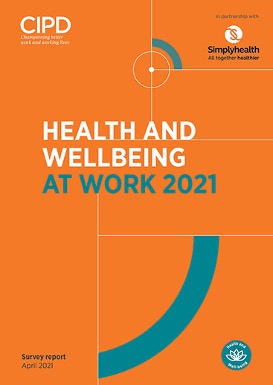
According to the CIPD’s Employee Outlook survey, being under too much pressure at least once a month makes individuals feel depressed or anxious, and most say it reduces performance.
Their Health and Wellbeing at Work 2021 report This shows that stress continues to be one of the leading causes of short and long-term absence.
- 59% of respondents state that workloads remain by far the most common cause of stress at work
- 32% of respondents state that management style was a significant cause
HR .com
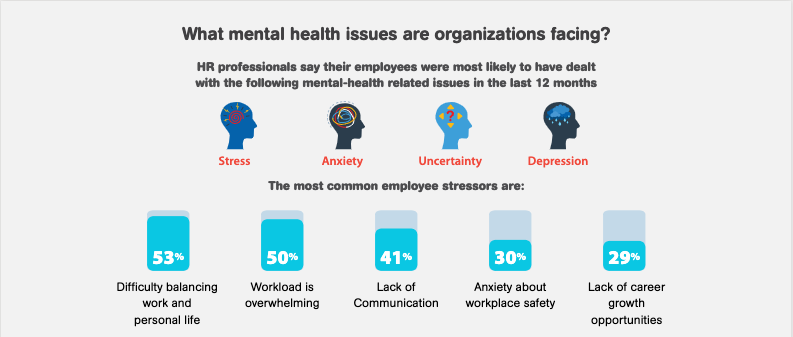
H.R. professionals say their employees were most likely to have dealt with the following mental-health-related issues in the last 12 months
- Stress
- Anxiety
- Uncertainty
- Depression
The most common employee stressors are:
- 53% have difficulty balancing work and personal life
- 50% find that their workload is overwhelming
- 41% feel there is a lack of Communication
- 30% experience anxiety about workplace safety
- 29% report a lack of career growth opportunities
Hybrid Working Research
Microsoft
In a report called The Next Great Disruption Is Hybrid Work – Are We Ready?, Microsoft found that as well as 54% of Generation Z workers, 41% of the entire global workforce could be considering handing in their resignation.
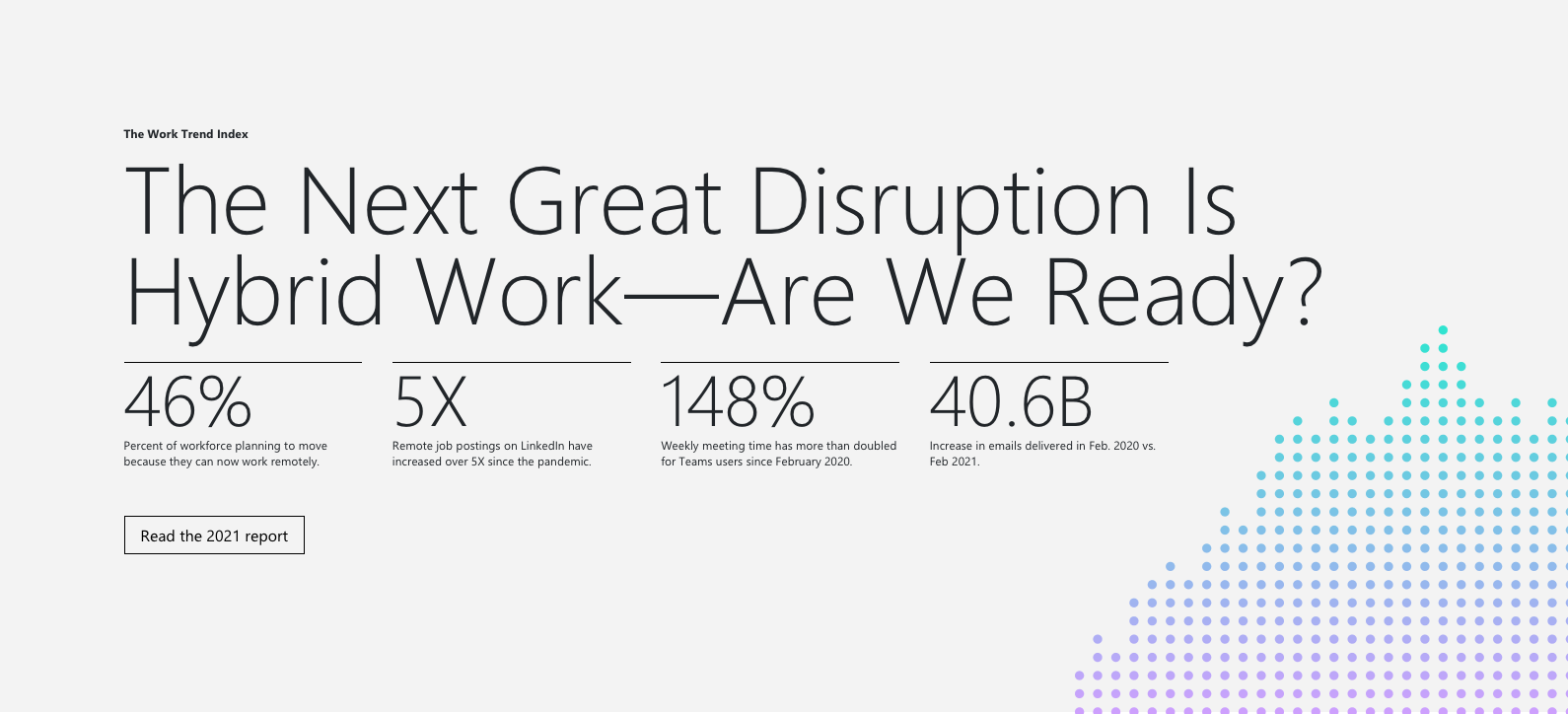
- 46% Percent of workforce planning to move because they can now work remotely
- Remote job postings on LinkedIn have increased over 5X since the pandemic.
- There has been a 148% increase in weekly meeting times for Teams users since February 2020.
- 40.6B increase in emails delivered in Feb. 2020 vs. Feb 2021.
- 61% of business leaders are coping well in the survey compared to their employees. Most leaders in their study were male information workers with an established career, the near opposite of those struggling most.
Future Forum Pulse
The Future Forum Pulse Report is from a survey of 10,737 knowledge workers across the US, Australia, France, Germany, Japan, and the UK conducted from November 1-30, 2021.
The report shows us the status of hybrid working, and that it is not only here to stay but a preferred way of working.
- 58% of knowledge workers are now working in hybrid arrangements.
- 68% say they prefer hybrid work
Flexible working is in great demand and key to retaining talent
- 78% of all respondents say they want location flexibility
- 95% want schedule flexibility
- 72% of workers who are dissatisfied with their current level of flexibility at work say they are likely to look for a new job in the next year
71% of executives report that they currently work from the office three or more days a week, compared with 63% of non-executive employees. In addition the employees who most want to work remotely are those from underrepresented groups, so there is a concern that “proximity bias” may lead to increases in inequalities along racial and gender lines.
If we build trust through transparency, we have some work to do. 72% of executives believe they’re transparent, but only 47% of employees agree. Therefore there are significant implications for employee experience and retention.
Working practices appear in need of some modernisation as one in two survey respondents said they “feel pressure to let colleagues or managers know I am at work and being productive.” This trend has increased quarter over quarter.
So how do hybrid working and fully remote working stack up against in-office working when it comes to employee satisfaction scores?
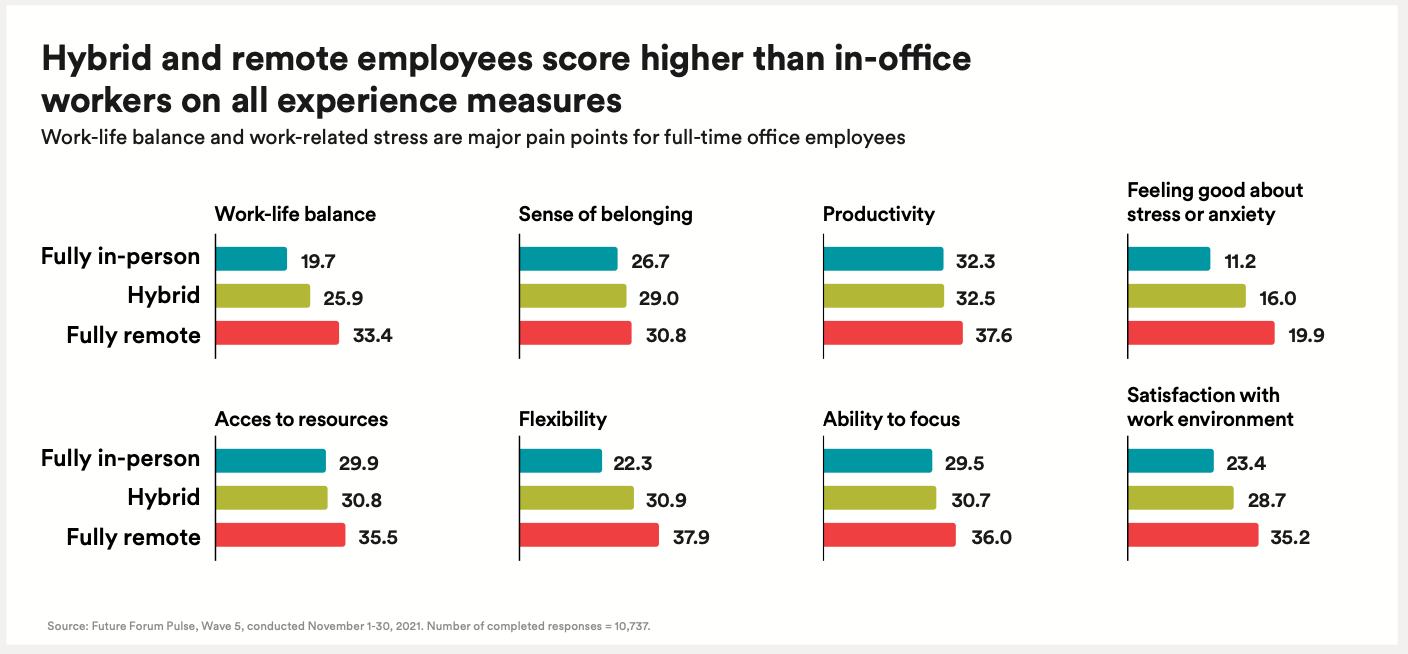 In every metric of employee experience, fully remote scores more highly than hybrid working, which in tern scores better than in-office working. What would these scores look like if we were all trained and effective at operating in this new environment?
In every metric of employee experience, fully remote scores more highly than hybrid working, which in tern scores better than in-office working. What would these scores look like if we were all trained and effective at operating in this new environment?
Other notable mentions
A UK and Ireland survey by Personio and Opinium found that 38% of employees were planning to leave their jobs in the next six months to a year.
The Prudential’s Pulse of the American Worker Survey reported that 42% of employees would quit if their company didn’t offer remote working options in the long term.
Conclusion
From the research referenced in this article it is clear that work has a negative health impact on a sizeable sector of our population. Our working practices are leading to stress which turns to burnout and resignations.
The problem? We’re not trained for this. Managers are buckling under the weight of outdated management expectations that don’t apply to completing complex, interdisciplinary work—let alone building shared purpose among a diverse and distributed workforce looking for connection during unstable times. - Future Forum
Many of these reports advocate urgent change to be led from a senior management level. Our next article will look at the recommendations from some of these reports along with strategies that support better hybrid working.
Photo by yang miao on Unsplash